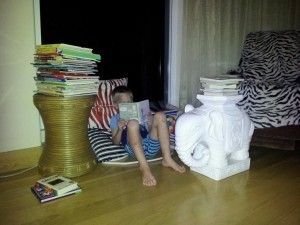how to flunk social media + lose me as a potential True Fan (but you know I love you)
The other day I finished reading the kind of novel you develop a relationship with: the characters move off the page to take up residence in your head. Their reality runs like a shadowy river alongside your own, waiting for you to step back into it.
When it was over, I leaped online to check out the author. For the most part, at least in my experience, literary writers tend to eye the social media platforms as if they're instruments of sexual bondage: I'm supposed to do what, exactly? Surely you're joking. What exactly is that, anyway?
gratuitious sexual bondage photo

Still, I was hoping for a blog. I wanted to prolong the experience of the novel by remaining in contact with the author's voice. At the same time, I was curious about the author. More than curious: I felt a respect and readerly affection for her.
I had touched her mind.
I had walked through her imagination.
I wanted to show up at her virtual doorstep with the equivalent of a bouquet of flowers to say thank you and let her know how much her novel meant to me. I was ready to evangelize her to the world – or at least my small corner of it.
reading is awesome

The website was static, uninteresting: I didn't care about any of the promotional stuff, I was looking for a blog, which there wasn't. The Facebook page and tweetstream were also broadcasting and promotional. I was invited to leave a message – a "polite" message, as if I was in danger of being rude – but the flush of my enthusiasm had faded and I no longer saw the point. So I clicked away.
I think about this now, because it reflects the changing nature of the artist-audience relationship. I bring different expectations to that relationship than I would have, say, five years ago, when of course the author would have remained this remote, mysterious figure in the distance, giving me a well-meaning wave through her book readings and interviews.
Now, here I was, ready to be not just a reader or an admirer but a True Fan, ready to spread the word.
And feeling denied.
What had I been expecting, exactly?
Interactivity. Engagement.
Not with me, since she had no idea who I was, and although I have many flaws I am not, at least to my knowledge, psychotic; but with others, as if she was holding court in the center of a café and I had wandered in to join the crowd. It was like she had spurned the café entirely – I'm supposed to do that? — and so I ordered my mocha latte and took my Android tablet from my bag and started on another book, another author, hoping to fall in love again, knowing that, sooner or later, I would.
As a reader of literary fiction, I'm probably not the norm: although I do indeed love the smell of a physical book, the flick of the pages, the creak of the spine, the heft of the thing in my hands, I do most of my reading on my devices (pick one: my smartphone, my tablet, my Kindle Fire). I'm a social media enthusiast, live on the edge of the tech industry and spend a lot of time online, which might be why I consider this to be a good and exciting time to be a writer. (Since I became a Kindle convert a couple of years ago, I buy and read even more books, not less – and, judging from the data, this is typical.)
But – dare I say – the future of reading looks like me (as William Gibson so succinctly put it, the future is already here, it's just unevenly distributed). And as my reading habits adjusted to the new technology, as I absorbed the values and customs of social media culture (transparency, authenticity, connectedness), I became one of those people formerly known as your audience.
It's no longer enough to seduce me with a good book.
My world is crowded, noisy, and moves at lightning speed.
In order to keep me as a longterm reader, you need to engage me, or in the time between your last work and your next work some other charismatic wave will have borne me away. It's the difference between checking out your next book and seeing if it appeals to me – and buying it immediately, no matter what the content, and talking about you to my friends, and on my blog and Facebook and Google+ and whatever else I happen to be using at the time.
Let me be clear: I don't expect or demand one-on-one communication. I am happy to remain faceless and nameless to you. But the online world is exactly that – a world — full-bodied and dazzling and multi-dimensional — and it's transformed my relationship to you (or any writer) into a place that I would like to find cool and interesting enough to visit. Often.
In his book SMART WORLD: Breakthrough Creativity and the New Science of Ideas, Richard Ogle talks about "idea-spaces" and "the extended mind". Basically, in order to navigate a complex and sophisticated world with as a little mental effort as possible, we offload our intelligence into the spaces around us through our myths, customs, technology, business models, codes of behavior. Our knowledge, our sets of ideas, live outside us (and breakthrough creativity happens when you can look across different idea-spaces, recognize emerging patterns and find new ways to fit them together).
What I wanted to find wasn't standard self-promotion….but the author's own personal idea-space, where she had offloaded enough of her mind and voice and personality (through blog posts and ongoing conversations) to invite me in relationship with her brand.
And yes, this requires extra, unpaid work on the part of any writer. Then again, writers always had to promote their stuff in one way or another. We also have to remember the definition of 'marketing' (taken from marketing genius and online master Marie Forleo):
…an emotional connection with the people whom you're meant to serve.
(Did handing out bookplates and bookmarks and badgering people to come to your book signings create that 'emotional' connection? At least in the old world, there was the illusion that that kind of marketing actually worked.)
You serve people – not all people but your people, your right people, your tribe – through creating value for them. And, increasingly, what that 'value' looks like is a sense of community: individuals gathered round that offloaded version of you holding court in the center of your thoughtfully constructed idea-space. You, and your work, become a social object that gives like-minded souls a reason, or an excuse, to come together. You're no longer simply 'marketing'; you're creating a little values culture.

Thing is, when different forces meet up with each other – when the distance drops away between artist and audience – chemistry ensues and transformation happens. Nothing brings us face-to-face with ourselves the way a relationship does, or exposes us to new ideas, or reshapes the ideas we may currently hold. A blog becomes more than a blog: a site of discovery, of creative and intellectual collaboration. It's a living document, forever evolving, as readers shift in and out, and create value for themselves and for you through comments and sharing.
There's you, and your audience, and then this thing, this entity, this energetic space, created when you come together. Jerry Garcia attributed the success of his band The Grateful Dead to the magic that happened at live performances when the Deadhead community fed the band with their energy. Since the band never played the same show twice — and believed in experimentation and innovation — they created a new show each time with the audience, responding to the audience even as the audience was responding to them. "Everybody should be in the band," Garcia enthused. "And when that's happening, it's really something special. It's an amazing thing."
When you erase the distinction between band and audience, between producer and consumer, wonderful things can happen. Ken Kesey once explained the difference between the Dead and other bands: "The Doors were playing at you. John Fogarty was singing at you," he said. Garcia, on the other hand, "was not playing [at the audience]. He was playing with them," and often members of that audience would realize, "He's not only moving my mind. My mind is moving him!"
I'm not saying that you should let your readers dictate your plot choices, or that you should compromise your vision or pander to your people (they're too smart for that, and will abandon you in droves). But I'm reminded of a recent post in which successful entrepreneur/author Jonathan Fields discusses his decision to blog less frequently so he can create greater depth and quality, more value, with each post. "I write to make a difference," he says, and refers to the "sweet spot between your authentic genius zone and the deeper needs of your community." As an entrepreneur, Fields knows what online marketing is – and isn't.
It's not a billboard to let your readers know how great and accomplished you are.
It's writing to make a difference.
It's a sweetspot. It's an idea-space. It's a relationship with your readers…that can move your mind.
That is, if you're willing to let it.








